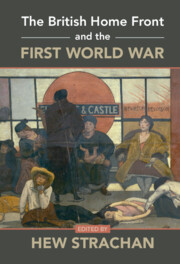Book contents
- The British Home Front and the First World War
- The British Home Front and the First World War
- Copyright page
- Contents
- Figures
- Tables and Charts
- Contributors
- Acknowledgements
- A Note on the Illustrations
- Introduction
- 1 The United Kingdom in 1914
- Part I Government
- Part II Resources
- Part III People
- Part IV Production
- 18 Munitions
- 19 Clothing and Uniforms
- 20 Britain’s Private Shipbuilding and Ship Repair Industries
- 21 Railways
- 22 Seaborne Trade and Merchant Shipping
- 23 Food
- Part V Social Impacts
- Conclusion
- Index
23 - Food
from Part IV - Production
Published online by Cambridge University Press: 23 February 2023
- The British Home Front and the First World War
- The British Home Front and the First World War
- Copyright page
- Contents
- Figures
- Tables and Charts
- Contributors
- Acknowledgements
- A Note on the Illustrations
- Introduction
- 1 The United Kingdom in 1914
- Part I Government
- Part II Resources
- Part III People
- Part IV Production
- 18 Munitions
- 19 Clothing and Uniforms
- 20 Britain’s Private Shipbuilding and Ship Repair Industries
- 21 Railways
- 22 Seaborne Trade and Merchant Shipping
- 23 Food
- Part V Social Impacts
- Conclusion
- Index
Summary
Societies need food to function and to help their citizens reach their potential. People who are satiated are, in general, not only healthier than people who are hungry, but also happier. Healthier and happier people experience increased well-being, which benefits not only themselves and those around them, but also the societies in which they live1. In wartime, the food of a society or nation is no less important than it is in peacetime, for similar reasons of health and happiness. Without sufficient food, soldiers will not have enough energy to engage in battles and may develop distrust in their leaders. Civilians on the home front, like civilians in peacetime, require adequate food in quantity and quality to engage in critical work to support the economic production of their nations, which in turn is vital for any war effort. Adequate food is thus necessary for civilians to maintain a modicum of belief in their leaders. When governments break the unspoken contract of ensuring, whether through private or public means, that a significant proportion of their populations have enough to eat, not only are individual people more hungry and less happy, societies at large suffer, and the legitimacies of states are weakened. This legitimacy weakens as the duration and intensity of food insecurity increases.
- Type
- Chapter
- Information
- The British Home Front and the First World War , pp. 469 - 486Publisher: Cambridge University PressPrint publication year: 2023



